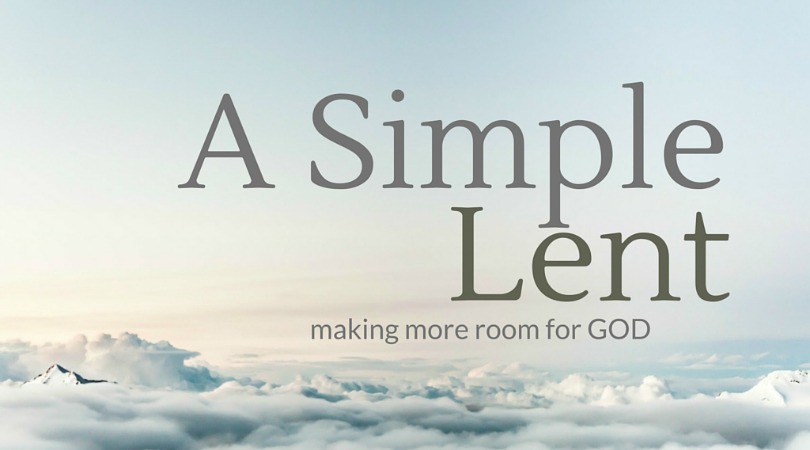To Save Life Or To Kill (Day 10 of A Simple Lent)
My absolute favorite part of Jesus’s teaching is his few teachings about Sabbath. I think dealing with them is an essential part of understanding Jesus.
Sabbath law is at the core of Torah. The literal observance of the Sabbath day is important. More important, however, is how Sabbath is weaved into the core methodology of creation, of how GOD sets up the blessed community, and what GOD dreams the kingdom will be revealed to be.
Sevens are woven throughout scripture, and often as an appeal to justice and equality; to the gathering of people to be as one. It is in the Jubilee and the gleaning of the fields; it is even in the gathering of baskets of bread in the second feeding of the multitudes in the gospels.
Sabbath is awesome. Which is why Jesus wants to reclaim it.
Not so awesome
The disciples are picking heads of grain and eating it, which, to equate with doing work on the Sabbath is a bit of a stretch. But to someone who is a stickler for the rules I guess it counts.
His response is to say that we aren’t to be ruled by the Sabbath – it is what makes us better, not what confines or reduces us.
We aren’t to use it as a cudgel to beat down someone else. It isn’t an opportunity to pass judgment on someone else: did they do the Sabbath right? Jesus seems to say it doesn’t actually matter.
But the better vision of Jesus’s teaching is in what he does next.
Being awesome
So he’s confronted about the Sabbath – his disciples are being judged for the way they’re observing it and he’s being judged for allowing it – and how does he respond?
He walks into a synagogue and in front of everybody, knowing exactly what they would think about him, heals a man with a withered hand.
BOOM! That’s the Jesus mic drop.
Here’s how much you don’t understand the Sabbath, he seems to be arguing. I’ll show you what observing the Sabbath actually means.
Here’s his reasoning:
‘Is it lawful to do good or to do harm on the sabbath, to save life or to kill?’
They don’t like it. Of course they wouldn’t. He just spat in their eye. And called them stupid.
To save
The deeper teaching Jesus is offering, beyond the atmospherics and the big show of value and intention, is to recast the value system of the Sabbath and reclaim its intention.
Yes, the Sabbath is for rest.
It’s also for justice and equality. It is for making sure everyone gets fed. It is for freeing slaves. It is for celebrating in the mercy of GOD.
So Jesus confronts them in their judgment and seems to say While you are all up in my face about resting, where is the justice? The Sabbath is about life and death. I’m choosing to save lives. By doing nothing, you are choosing to kill.
To kill
Where in our lives do we see impacts of our doing nothing and our status quos? Where are those places in which our passive inaction is what kills?
There’s a famous study in which they simulate a situation of life and death. A whole bunch of people are trapped on a bridge and there is one morbidly obese person making the group too heavy to be saved. Do you push the man off the bridge to save the lives of the rest?
Most of us don’t push the man. We don’t want to be directly responsible for the man’s death. And we will accept the secondary responsibility for the death of the other people.
When they change the language of the instructions, however, it causes people to move their thinking into the logical reasoning part of the brain. Suddenly most people who are put in the situation come to see their decision as being directly related to either one death or a dozen.
Rather than encouraging people to push other people off bridges or to become cold, unfeeling jerks, I suggest that the study helps us see our world much as Jesus does. That our passive indecision is actually a decision and that our secondary responsibility through inaction is very much responsibility for death.
Saving, not killing
How then might we be saving lives? How might we act to prevent death?
Where are we already making decisions by not making a decision? Where in our lives are we sentencing people to death through inaction? Where in our common life do we see this most clearly?
Where are the withered hands that need to be healed because it’s the Lord’s Day rather than in spite of it?
Where are those places of action in our church, our personal lives, our world which need us to stand up in spite of judgment, not to condemn another, but to save life?
Where is life in our midst?
Daily Office Readings
Psalm 55
Genesis 41:1-13
1 Corinthians 4:1-7
Mark 2:23-3:6
Or visit the alternative Daily Office I often use.
Homework
This week’s homework is to discern a priority and focus on it.
Download the worksheet: A Simple Lent – Handout 1!


Leave a Reply